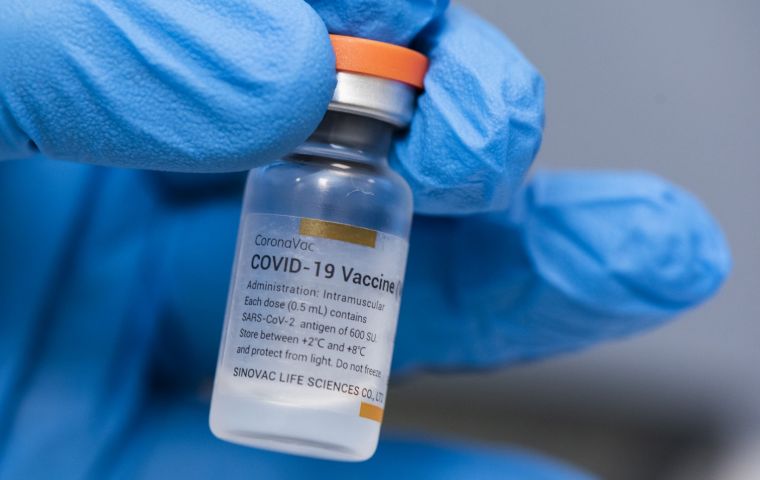MercoPress. South Atlantic News Agency
Butantan study shows remarkable results with Brazilian produced CoronaVac immunizer

The prestigious Butantan Institute Monday released the results of a study carried out between February and April 2021 among 27,000 people vaccinated with CoronaVac in Serrana, São Paulo, which showed a 95% decrease in deaths from covid-19, it was announced.
In addition to the 95% decrease in deaths, also an 86% reduction of hospitalizations and 80% in symptomatic cases of covid-19 were reported.
The immunization of the entire adult population of the municipality of Serrana, in the state of São Paulo, with the CoronaVac vaccine produced by Butantan, caused the symptomatic cases of Covid-19 to fall 80%, hospitalizations, 86%, and deaths, 95% later of the second vaccine of the last group.
That is the main conclusion of the so-called Project S, an unprecedented clinical study of effectiveness in the world carried out by the Butantan Institute.
The reduction was verified by comparing data from the beginning of the project - until the vaccination of all groups was completed - with the remainder of the February-April 2021 quarter.
The results also showed that vaccination protects both adults who received both doses of the vaccine and children and adolescents under 18 years of age, who were not vaccinated.
“The reduction in cases in people who did not receive the vaccine indicates the decrease in the circulation of the virus. This reinforces vaccination as a public health measure, and not just individual,” explains the director of clinical trials at the Butantan Institute, Ricardo Palacios, who also supervised the study.
Another important conclusion is the evaluation of the incidence of the disease in Serrana in comparison with neighbouring cities. Serrana has about 10 thousand inhabitants who work in Ribeirão Preto daily. However, while Ribeirão Preto and cities in the region have been showing an increase in Covid-19 cases, Serrana maintained low incidence rates thanks to vaccination.
In other words, in addition to the decrease in infections, the inhabitants who transit in other cities did not have a relevant increase in cases. Project S created an “immune belt” in Serrana, a collective barrier against the virus, drastically reducing transmission in the municipality.
“The important conclusions of the study were able to underpin immunization strategies in Brazil and the world and offered hope of controlling the pandemic with vaccines such as CoronaVac,” says the president of the Butantan Institute, Dimas Covas.
“We do not need to create islands to achieve immunity for the population,” Palacios added. “We manage to satisfy people's will to resume their lives when they are vaccinated. That gives us a light of hope,” he went on.
The research, a pioneer in the world, was developed by Butantan, approved by the Ethics and Monitoring Committee of USP's Ribeirão Preto School of Medicine and endorsed by the National Health Surveillance Agency of Brazil (Anvisa).
It was carried out in conjunction with the Ministry of Health and the Municipal Prefecture of Serrana. The objective of the project is to understand how effective CoronaVac is, that is, how the immunization of an entire population can affect the course of the epidemic. In practice, understand how the vaccine behaves in the real world.
The method used for the clinical trial is called the stepped-wedge trial. Serrana was divided into 25 areas, forming four groups: green, yellow, grey and blue, which received the immunizer following that order. The vaccine was offered to all those above 18 years of age-eligible for the study in these areas, sequentially, in four stages.
Between February 17 and April of this year, over eight weeks, about 27,000 inhabitants of the municipality received the complete vaccination schedule: two doses of CoronaVac with an interval of 28 days between the first and the second. This represented a coverage close to 95% of the adult population, according to the health census previously carried out by Butantan.
Palacios explains that the staging method allowed evaluating and comparing the four vaccinated areas. “We perceive that the observed phenomena do not occur randomly, but are repeated in the four groups at different times,” he says. “The most important result was to understand that we can control the pandemic without vaccinating the entire population. When coverage of 70 to 75% was achieved, the drop in incidence was perceived even in the group that had not yet completed the vaccination schedule.”
The vaccine is safe, effective, efficient, of the highest quality, and contributes to preventing the development of the disease, complications and deaths among those infected. Now we also know that it has a beneficial effect on an entire population, protecting both the vaccinated and the unvaccinated and expressively reducing viral circulation ”, concluded Dimas Covas.




Top Comments
Disclaimer & comment rulesCommenting for this story is now closed.
If you have a Facebook account, become a fan and comment on our Facebook Page!